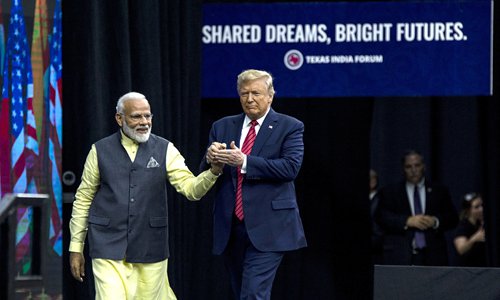Howdy: Though Trump pats Modi, India won’t do US bidding against China

Photo: VCG
US President Donald Trump participated in a rally called "Howdy, Modi!" with visiting Indian Prime Minister Narendra Modi in Houston on Sunday. It was attended by around 50,000 people of Indian origin.Some Indian media outlets described it as "Trump's unprecedented gesture," revealing that the Trump administration has attached importance to Washington-New Delhi ties. Trump may have more than that on his mind.
Trump tends to be a utilitarian and all his current political moves seem to be directed at winning the 2020 presidential election. There are nearly 4 million Indian Americans living in the US, but most of them support the Democratic Party.
In the 2016 election, 80 percent of them voted for Hillary Clinton, according to a poll conducted by the Asian American Legal Defense and Education Fund. Trump seems to be found wanting in confidence in dealing with the Indian community in the US. This rally provided the US president an opportunity to win their support.
In his speech, Trump praised Modi as "one of America's greatest, most devoted, and most loyal friends" and said Washington-New Delhi ties are "stronger than ever before," while Modi called Trump "my friend, a friend of India, the great American President Donald Trump."
Both the US and India have reasons to enhance bilateral ties. For the US, the significance of India has been mounting. In terms of economy, India is important but not crucial to the US, because the South Asian country is not considered a vital economy by Washington. Although the Indian market has long been believed to harbor potential, it has not been fully exploited. The significance of India to the US mainly lies in strategy and security. Washington wants to woo this quasi ally and upgrade the latter's status in the superpower's global strategic layout.
India harbors the intention of reinforcing ties with the superpower in diverse realms and seems to be willing to participate in the camp led by the US, although New Delhi is reluctant to pick sides between China and the US, or between Russia and the US.
India shares common interests with the US in many aspects, and extended bilateral cooperation can be expected in the future. For example, the US is India's second-biggest arms supplier. The US attaches great importance to the Indian market, while New Delhi, the world's second-largest arms importer, has high expectations of weapons trade from Washington.
The two countries hit it off geopolitically as well. The Trump administration's regards India's role as pivotal, which caters to the Asian country's desire to increase its influence in the region.
Yet India does not totally trust the US and worries about being abandoned or betrayed. Therefore, New Delhi would maintain its diplomatic independence and refuse to blindly follow the superpower.
Meanwhile, India is keeping solid relations with other great powers such as China and Russia. As China is one of its important neighbors, India is aware of China's importance. New Delhi knows well that if its ties with Beijing head toward a negative trend, it will be detrimental to India's security and economy. As a result, India would not likely be seen openly siding with the US in taking on China.
But New Delhi has its guard up against Beijing. Some Indian observers see China as their biggest threat. Amid increasing US-China rivalry, India will take advantage of the situation. While leaning toward Washington, New Delhi will prudently deal with trilateral ties, making its China and American policy work in its best interest.
The article was compiled by Global Times reporter Lu Yuanzhi based on an interview with Zhao Gancheng, a research fellow at the Shanghai Institute for International Studies. opinion@globaltimes.com.cn

